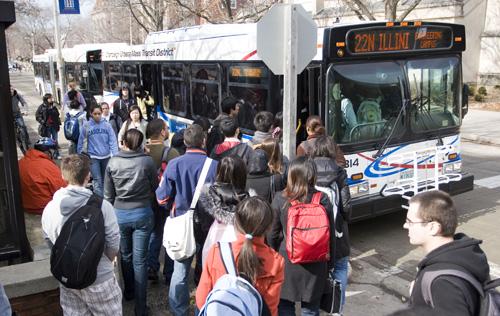Busy bus routes leave students in cold

Students board a 22 North Illini bus outside the Main Library at the corner of Armory and Wright Streets in Champaign on Monday. Erica Magda
February 10, 2009
It’s happened to many students on campus: They were late for class, but the bus was full and they got left out in the cold.
Some of the bus routes on campus get congested during class time on weekdays and evenings on weekends. During these times taking the buses can become uncomfortable, and occasionally students are not allowed to board if the buses have reached capacity. Thomas Costello, assistant managing director of the Champaign-Urbana Mass Transit District, said that despite the best efforts of the company it does sometimes happen.
“If everybody on campus wants to use a bus there probably aren’t enough buses in America to meet that demand,” Costello said.
Costello citedclass schedules and students trying to use the bus system at the same time. He said it can be easy to predict where extra buses will be needed. The MTD sends several extra buses during the rush to morning classes on weekdays.
“There were way too many people on the buses last week because it was so cold,” said Cara Walton, senior in FAA. “The bus didn’t let anybody off so nobody got on and I walked down the block to another stop.”
Get The Daily Illini in your inbox!
There are usually plenty of extra buses and the only problem comes when the MTD doesn’t know where extra buses are going to be needed. When there are unexpectedly more students than available space on buses, it takes extra time and there will inevitably be students waiting outside in the cold, Costello said.
“If someone is left behind, we typically try to send another bus,” Costello said. “We will call one of our back-up buses and they will pick up the extra students as quickly as possible.”
Costello said there are also things students can do to help make sure they are not left behind, or at least help make overcrowding more bearable. He said that students should try to use the bus during times when they will not be as congested. Leaving 20 minutes before class to catch the bus solves that problem, he said.
“I would hope students would empathize with the one who has to be left behind and that they would realize that some time it might be them instead,” Costello said.
In addition to weekday mornings, the buses tend to be crowded after the bars close and the MTD has a hard time responding, Costello said.
“I came back from a campus party once and there were a lot of people like me trying to get home on the bus,” said Raymond Kongwa, a graduate student. “I wasn’t part of the small group of people they let on so I had to walk home in the cold.”
Costello emphasizes that competently serving students is the MTD’s first priority.
“We certainly don’t want to be leaving anybody behind,” Costello said.






